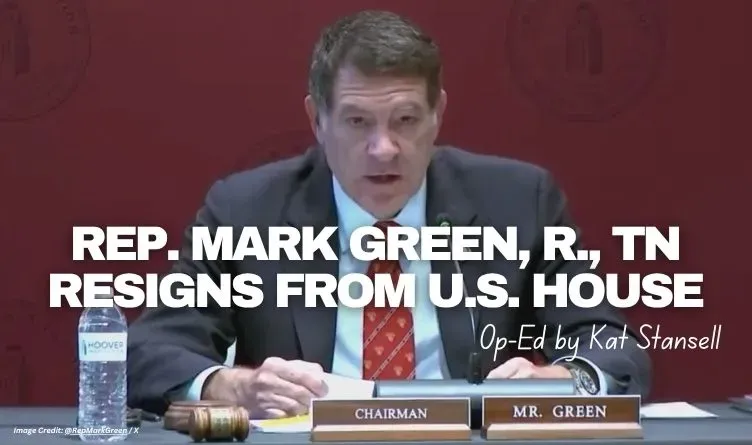Rep. Mark Green’s resignation from Congress has taken center stage in recent political news, significantly impacting the House Republican majority. The Republican representative from Tennessee has decided to step down officially, a move that comes right after supporting President Donald Trump’s ambitious megabill. With Green’s departure, Speaker Mike Johnson faces the daunting challenge of managing an even narrower majority in the House, now standing precariously at 219-212. As anticipated, Green’s exit is expected to have implications not only for the party but also for ongoing legislative efforts, particularly in the context of Trump’s initiatives. This shake-up raises questions about the future dynamics of the Republican Party and how they will navigate the complexities of governance without one of their prominent voices.
In a significant shift within the political landscape, the announcement of Rep. Mark Green’s departure from his congressional role has reverberated through the Republican ranks. As a key member of the House, his decision to resign marks a pivotal moment, especially as House Speaker Mike Johnson attempts to unify a fragile party majority. Green’s move, which follows a vote on a major piece of legislation spearheaded by Donald Trump, plays into the wider narrative of ongoing changes within the House. This resignation not only alters the composition of Republican leadership but also raises questions about how it will influence upcoming elections and legislative strategies moving forward. The implications of Green’s announced retirement could be far-reaching, affecting everything from party cohesion to voter sentiment.
Implications of Rep. Mark Green’s Resignation for House Republicans
Rep. Mark Green’s resignation from Congress not only marks the end of his tenure as a representative but also signifies a notable shift in the House Republican majority. With Green’s decision to step down, the Republican majority has been reduced to a precarious 219-212. This change could have serious implications for legislative actions, especially as House Speaker Mike Johnson navigates the challenges that come with a tighter margin. The dwindling numbers mean that any dissent among party members could jeopardize critical votes, particularly on key issues that align with the party’s agenda such as President Trump’s proposed megabill.
The landscape of the House is already fraught with challenges, and Green’s departure adds to the uncertainty. Analysts suggest that the need for unity within the party is now more crucial than ever. As powerful factions within the House hold different views on policy matters, maintaining a cohesive front will be an uphill battle for Speaker Johnson. The immediate aftermath of Green’s resignation raises questions about how the Republican leadership will address both the legislative agenda and internal party dynamics, particularly as they seek to sustain momentum heading into the next election cycle.
Frequently Asked Questions
What led to Rep. Mark Green’s resignation from Congress?
Rep. Mark Green resigned from Congress, citing a desire to start a new business focused on helping America compete against the Chinese Communist Party (CCP). His resignation follows his support for President Donald Trump’s megabill and comes at a time when House Speaker Mike Johnson is dealing with a narrow Republican majority in the House.
How does Rep. Mark Green’s resignation affect the House Republican majority?
Rep. Mark Green’s resignation reduces the Republican majority in the House to 219-212, creating an even more challenging environment for House Speaker Mike Johnson to pass legislation, especially in light of the recent budget reconciliation discussions.
When is Rep. Mark Green’s resignation effective?
Rep. Mark Green’s resignation from Congress is effective on July 20, after which the Republicans will maintain a slimmer majority until his solidly Republican seat is filled.
What position did Rep. Mark Green hold before his resignation?
Before his resignation, Rep. Mark Green served as the Chair of the House Homeland Security Committee, where he was involved in significant legislative discussions, including those surrounding President Trump’s megabill.
What are the implications of Rep. Mark Green’s resignation for House Speaker Mike Johnson?
House Speaker Mike Johnson faces increased difficulties following Rep. Mark Green’s resignation, as it weakens his already narrow Republican majority and complicates efforts to pass key legislation, such as President Trump’s megabill.
What future plans did Rep. Mark Green mention after his resignation?
After his resignation from Congress, Rep. Mark Green announced plans to start a new business aimed at enhancing America’s competitive stance against the CCP, although specific details about the business were not disclosed.
Has Rep. Mark Green’s resignation been anticipated?
Yes, Rep. Mark Green’s resignation was anticipated, especially after he indicated his intention to step away from his congressional role in June, amidst broader turnover among Republican lawmakers.
What does Rep. Mark Green’s resignation mean for potential elections in 2025?
Rep. Mark Green’s resignation could open opportunities for Democrats to challenge in the upcoming elections, particularly in his solidly Republican district, while also reflecting wider Republican instability in the House.
Who expressed gratitude in the announcement of Rep. Mark Green’s resignation?
In his announcement, Rep. Mark Green expressed gratitude to his constituents in Tennessee’s 7th District, thanking them for their trust and support during his time in office.
What other recent departures have there been among House Republicans besides Rep. Mark Green?
Besides Rep. Mark Green, other recent departures among House Republicans include Rep. Mike Waltz, who left for the Trump administration, and Rep. Don Bacon, who has also announced his retirement, further complicating Republican prospects in the House.
| Key Point | Details |
|---|---|
| Resignation Announcement | Rep. Mark Green officially resigns from Congress, effective July 20. |
| Reason for Resignation | Green is starting a new business but did not disclose specifics. |
| Impact on Republican Majority | His resignation reduces the Republican majority in the House from 220-212 to 219-212. |
| Speaker’s Challenge | Speaker Mike Johnson’s ability to pass legislation may become more difficult due to a slimmer majority. |
| Future Plans | Green plans to help America compete against the Chinese Communist Party through his new business. |
| Previous Position | Prior to resignation, Green served as the Chair of the Homeland Security Committee. |
| Congressional History | Green was elected to Congress in 2018, succeeding Sen. Marsha Blackburn. |
Summary
Rep. Mark Green’s resignation marks a significant moment in Congress, as it leaves Speaker Mike Johnson navigating an even tighter Republican majority. With Republicans now holding 219 seats compared to Democrats’ 212, this development could create challenges for the passage of future legislation, particularly in light of legislative efforts touted by President Trump. Green’s departure further emphasizes the ongoing turnover within the Republican ranks, following the trend of several lawmakers stepping back recently. As Green focuses on new ventures aimed at enhancing U.S. competitiveness against the Chinese Communist Party, his absence from the House will be felt during this tumultuous political period.



